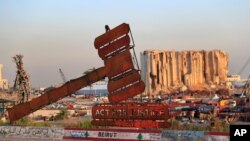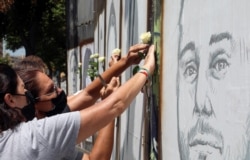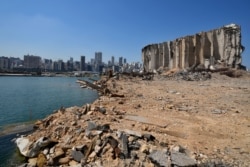U.N. High Commissioner for Human Rights Michelle Bachelet is calling for a thorough investigation into the causes of last year’s Beirut port explosion that decimated large swathes of Lebanon’s capital city.
The explosion of tons of ammonium nitrate stored at the Beirut Port killed more than 200 people, injured thousands more, and caused an estimated $15 billion in property damage, leaving some 300,000 people homeless.
The United Nations is commemorating the first anniversary of this tragic event with a minute of silence at ground zero and a message of mourning. Additionally, an international pledging conference co-sponsored by France and the U.N. will seek to raise 350 dollars million dollars in emergency aid.
To date, no one has been held accountable for the Beirut blast. This, despite mounting evidence of corruption and mismanagement by senior Lebanese officials that allowed these powerful explosives to be stored in a heavily populated civilian area.
High Commissioner Bachelet’s spokeswoman Marta Hurtado says the initially powerful spirit of national solidarity that emerged in response to the blast seems to have been forgotten.
“The government initiated judicial proceedings. But 12 months on, victims and their loved ones are still fighting for justice and truth. Investigations appear to have stalled, amid a worrying lack of transparency and accountability,” she said.
Hurtado says the country is teetering on the brink of economic collapse made worse by the COVID-19 pandemic and political instability. Nevertheless, she says these challenges must not stand in the way of an effective, impartial investigation into what happened last August from going ahead. She says the High Commissioner stresses the importance of holding those responsible accountable.
“The High Commissioner is also calling on the authorities to uphold the right of victims to effective remedy and reparations. One victim, who lost her husband, her brother, and a cousin in the blast, said she would keep seeking the truth to her last breath. The authorities must pursue the investigations with similar resolve,” she said.
The U.N. children’s fund supports the High Commissioner’s plea for accountability. A recent survey finds 98 percent of families in Lebanon are in acute need one year after the blast. The assessment highlights the severity of trauma experienced by children to this day.
UNICEF is calling on Lebanese leaders to overcome their political differences and put the country on the road to recovery. It says they must bring justice to families affected by the blast and hold those responsible to account.







